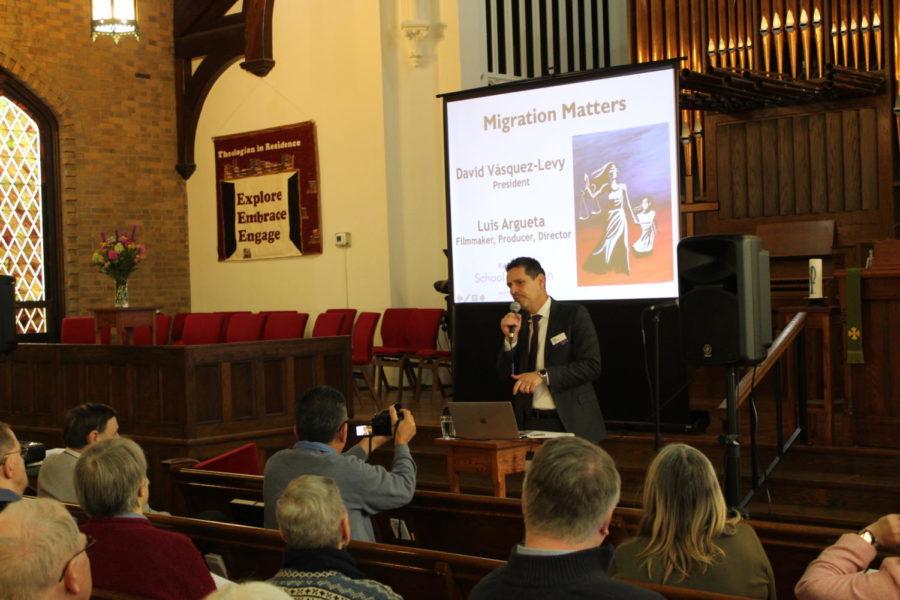Speakers discuss immigration issues at United Church of Christ
Revered David Vásquez-Levy (Pictured) and Luis Argueta told the shared stories of those affected by the Postville raid in 2008 and talked about issues surrounding the current climate of immigration.
March 3, 2019
The Postville, Iowa raid, immigrants rights and support of immigrants were discussed at the Ames United Church of Christ Saturday.
From 9:15 a.m. to 12:30 p.m., attendees listened to David Vásquez-Levy, reverend and president of the Pacific School of Religion in Berkeley, CA, speak about issues surrounding immigration and how he relates them to theology.
Select scenes from fellow speaker Luis Argueta’s film “abUSed: The Postville Raid” were shown throughout the lecture.
The Postville raid took place in 2008, when 900 U.S. Immigration and Customs Enforcement (ICE) agents arrested almost 400 employees at the Agriprocessors meatpacking plant.
Vásquez-Levy encouraged those in the audience to lean on their faith and their faith communities to help embolden them and give them the energy to take action.
“The world does not need our despair, it does not need our guilt,” Vásquez-Levy said. “What it needs is our courage and our imagination in order to bring about change.”
Framing the conversation around migration, Vásquez-Levy said, migration is always brought on by either a push or pull factor, or a combination of the two.
While other economic or political factors influence migration, Vásquez-Levy said, immigration always revolves around a common driving factor.
“There are crises, there are environmental changes, there are political collapses, all of those things are important. There is violence in Central America pushing people, but, ultimately, human history of migration is always tied to trade, it always has, it always will,” Vásquez-Levy said.
Vásquez-Levy made connections to current events of push and pull factors as they related to Bible stories. He said the story of the book of Ruth was comparable to the political unrest in Syria, as they were both rooted in famine and drought.
These push and pull factors had existed in his home county of Guatemala, Argueta said. He said he saw people who moved from the north of Guatemala to the south to pick cotton, working for very little pay.
When Argueta asked one of them why they would pursue this for such little pay, he said the man answered that having only a little is a lot, when compared to nothing. He said he felt similar sentiments to the immigrants who worked in the meat packing plant in Postville.
Portions of “abUSed” were shown throughout the lecture, telling the stories of the children and families that were affected by the Postville raid and detailing the trauma they experienced losing their parent or spouse.
Argueta said in the process of filming his documentary, he originally only planned to spend four days to do a short series of interviews, but he ended up taking 29 trips to Postville in total, because he found brotherhood with the immigrants he spoke with during his visits.
Vásquez-Levy had audience members read excerpts from the Book of Exodus and connect the experience of those in Postville to the pieces of exodus which were read.
The reality of fear, Vásquez-Levy said, was one of the connective themes between Exodus and Postville and the greater narrative surrounding immigration. The Pharaoh, Vásquez-Levy said, dominated the narrative with a false statement that the Israelites were more powerful than the Egyptians and held the ability to overthrow them.
To make the necessary changes, Vásquez-Levy said, one needs a multifaceted approach. He illustrated this point by showing that Moses’s sister engaged Pharaoh’s daughter, a person with privilege and authority, to get Pharaoh to pay to raise Moses, the one who would ultimately upend Pharaoh’s systems of oppression.
Attendees also had the choice to engage in one of two workshops. Sonia Parras Konrad, an attorney and activist who helped obtain 176 U-Visas for immigrants and their families who were targeted in the Postville raid to stay in the U.S. and work, helped attendees recognize how they could use their personal talents to get involved with supporting immigrants in their own community.
Erica Johnson, director of the American Friends Service Committee Iowa Immigrant Rights Program, lectured from from 1:15 to 3:00 p.m. Saturday about recent legislation against immigrants, as well as the climate surrounding immigration at the legislative level and what attendees can do to support immigrant populations.
Three of Argueta’s films on immigration were being sold at the event as well as a t-shirt. 50% of the proceeds from the t-shirts were donated to the ACLU’s Immigrant’s Rights Project.
Vásquez-Levy and Argueta returned Sunday alongside Violeta Alemán, who worked with the response and recovery efforts in Postville, and she became a coordinator in the Immigrant Survivor Advancement Program as a part of a question and answer panel.
Ames community members were given an open forum to ask questions about topics covered throughout the previous presentations and reflect further on what they could do to support immigrant populations nationally and in their own communities.
By giving immigrants more broad paths to citizenship, Vásquez-Levy said, we could begin taking the needed steps to structurally reform our immigration policies.
“Over the last thirty years we have not adjusted our opportunity for people to come in as documented immigrants, but we’ve needed their labor,” Vásquez-Levy said. “So, how do we, as a society, take some responsibility for the fact that these folks are here as undocumented immigrants, and not only blame it on the individual, so, the final thing I’ll say is we need to think of immigration in systemic ways.”
Other topics of discussion included the exploitation of undocumented labor, and how best to assist immigrant communities without silencing their voice with a white savior complex.
Vásquez-Levy also hosted a worship service, which was open to the public, after the panel discussion concluded.







